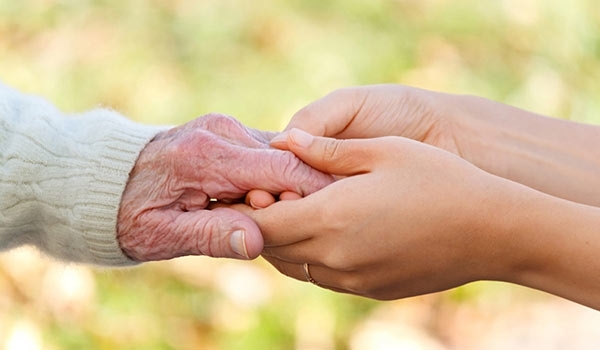30. Being dutiful to the closest relative and then the next closest
60. It is reported that al–Miqdam ibn Ma’dikarib heard the Messenger of Allah, may Allah bless him
and grant him peace, say, “Allah enjoins you to be dutiful to your mothers. Then He enjoins you to be
dutiful to your mothers. Then He enjoins you to be dutiful to your fathers. Then He enjoins you to be
dutiful to your next closest relative and then to your next closest relative.”
61. Abu Ayyub Sulayman, the mawla of ‘Uthman ibn ‘Affan, said, “Abu Hurayra came to us on a
Thursday evening, the night before Jumu’a. He said, ‘Every individual who severs ties of kinship is
constricted when he leaves us. No one left until he had said that three times. Then a young man went
to one of his paternal aunts with whom he had severed ties two years previously. He went to her and
she asked him, ‘Nephew! What has brought you?’ He replied, ‘I heard Abu Hurayra say such–andsuch.’ She said, ‘Go back to him and ask him why he said that.’ Abu Hurayra said, ‘I heard the Prophet,
may Allah bless him and grant him peace, say, “The actions of the children of Adam are presented
before Allah Almighty on Thursday evening, the night before Jumu’a. He does not accept the actions
of someone who has severed ties of kinship.”‘”
62. Ibn ‘Umar said, “Nothing that a man spends on himself and his family, anticipating a reward from
Allah, will fail to be rewarded by Allah Almighty. He should begin with those whose support is his
responsibility. If there is something left over, he should spend it on his next nearest relative and then
the next nearest. If there is still something left over, he can give it away.”
31. Mercy will not descend on people when there is someone among them who severs
ties of kinship
63. ‘Abdullah ibn ‘Awfa reported that the Prophet, may Allah bless him and grant him peace, said,
“Mercy does not descend on a people when there is someone among them who severs ties of kinship.”
32. The wrong action of someone who severs ties of kinship
64. Jubayr ibn Mu’tim reported that he heard the Messenger of Allah, may Allah bless him and grant
him peace, say, “The one who severs ties of kinship will not enter the Garden.”
65. Abu Hurayra reported that the Messenger of Allah, may Allah bless him and grant him peace, said,
“Ties of kinship (rahim) is derived from the All–Merciful (ar–Rahman). They say. ‘My Lord! I have
been wronged! My Lord! I have been cut off! My Lord! I haveÉ! I have!’ Allah answers them, ‘Are
you not content that I cut off the one who cuts you off and I maintain connections with the one who
maintains connections with you?'”
66. Sa’id ibn Sam’an heard Abu Hurayra seeking refuge from the power of children and fools. Sa’id
said, “Ibn Hasana al–Juhani told me that he asked Abu Hurayra, ‘What is the token of that?’ He
replied, ‘That he severs ties of kinship, obeys someone who is in error, and disobeys the correct
guide.'”
33. The punishment of someone who cuts off ties of kinship in this world
67. Abu Bakra reported that the Messenger of Allah, may Allah bless him and grant him peace, said,
“There is no wrong action which Allah is swifter to punish in this world – in addition to the
punishment which He has stored up for the wrongdoer in the Next World – than cutting off ties of
kinship and injustice.”
34. The one who maintains ties of kinship is not the one who reciprocates
68. ‘Abdullah ibn ‘Amr reported that the Prophet, may Allah bless him and grant him peace, said, “The
one who maintains ties of kinship is not the one who reciprocates. The one who maintains ties of
kinship is the one who, when his relatives cut him off, maintains ties of kinship.”
35. The excellence of someone who maintains relations with relatives who are unjust
69. Al–Bara’ said, “A bedouin came and said, ‘Prophet of Allah! Teach me an action which will enable
me to enter the Garden.’ He said, “The question is a broad one, even though you have asked it in only
a few words. Free someone. Set a slave free.’ He said, ‘Are they not the same thing?’ ‘No,’ he replied,
‘Freeing someone is setting someone free yourself. Setting a slave free is to contribute to the price of
setting him free. Lend an animal for milking which has a lot of milk and treat your relatives kindly. If
you cannot do that, then command the good and forbid the bad. If you cannot do that, then restrain
your tongue from everything except what is good.”
36. Those who maintained ties of kinship in the Jahiliyya and then became Muslim
70. Hakim ibn Hizam said to the Prophet, may Allah bless him and grant him peace, “Do you think
that the acts of worship which I used to do in the time of the Jahiliyya – maintaining relations with
relatives, setting slaves free and sadaqa – will bring me a reward?” Hakim said that the Messenger of
Allah, may Allah bless him and grant him peace, said, “When you become Muslim, you keep the good
actions you have already done.”
37. Maintaining ties of kinship with the idolater and giving gifts
71. Ibn ‘Umar said, “‘Umar saw a silk robe for sale. He said, ‘Messenger of Allah, would you buy this
robe and wear it on Jumu’a and when delegations visit you?’ He replied, ‘Only a person who has no
portion in the Next World could wear this.’ Then the Messenger of Allah, may Allah bless him and
grant him peace, was given some robes made of the same material. He sent one of the robes to ‘Umar.
‘Umar exclaimed, ‘How can I wear it when you said what you said about it?’ The Prophet replied, ‘I did
not give it to you so that you could wear it. You can sell it or give it to someone.’ ‘Umar sent it to one
of his half–brothers by his mother who was still an idolater.” (see 26)
38. Learn your lineages so that you can maintain ties of kinship
72. Jubayr ibn Mut’im said that he heard ‘Umar ibn al–Khattab say on the minbar, “Learn your
lineages so that you can maintain ties of kinship. By Allah, if there are some bad feelings between a
man and his brother and he knows that there is kinship between him and that man, that will prevent
him from breaking with him.”
73. Ibn ‘Abbas said, “Keep a record of your lines of descent so that you can maintain ties of kinship.
He will not make his relatives distant when they are close relatives, even if they live far away. He will
not consider them to be close relatives if they are distant ones, even if they live near to him. Every
time of kinship will come on the Day of Rising in front of each individual and testify on his behalf
that he has maintained that tie of kinship if he did indeed maintain it. It will testify against him that he
cut if off if he cut it off.”
III. Mawlas
39. Can a mawla say, “I am from so–and–so”?
74. ‘Abdu’r–Rahman ibn Habib said, “‘Abdullah ibn ‘Umar asked me, ‘Which clan are you from?’ I
replied, ‘From Taym of Tamim.’ He asked, ‘One of themselves or one of their mawlas?’ ‘One of their
mawlas,’ I replied. He said, ‘So why did you not say, ‘One of their mawlas’?”
40. The mawla of a people is one of them
75. Rifa’a ibn Rafi’ reported that the Prophet, may Allah bless him and grant him peace, said to ‘Umar,
“Gather your people [the Muhajirun] for me.” He did so. When they reached the door of the Prophet,
may Allah bless him and grant him peace, ‘Umar came to him and said, “I have gathered my people
for you.” The Ansar heard that and said, “Revelation has been revealed about Quraysh.” People came
to see and hear what would be said to them [the Muhajirun]. The Prophet, may Allah bless him and
grant him peace, came out and stood in the midst of them. He said, “Are there those among you who
are not of you?” They replied, “Yes, there are those among us with whom we have made treaties as
well as our nephews and our mawlas.” The Prophet said, “Our ally is one of us. Our nephew is one of
us. Our mawla is one of us.” You who are listening: our friends among you are those who have taqwa
of Allah. If you are one of them, then that is good. If that is not the case, then look out. People will
bring their actions on the Day of Rising and you will come with burdens and you will be shunned.”
Then he called out, “O people!” He raised his hands and put them on the heads of Quraysh. “O people!
Quraysh are the people of trustworthiness. If anyone who oppresses them (and one of the transmitters
thought that he said, ‘faults them’), Allah will overturn him.” He repeated that three times.
To be continued In shaa Allah



